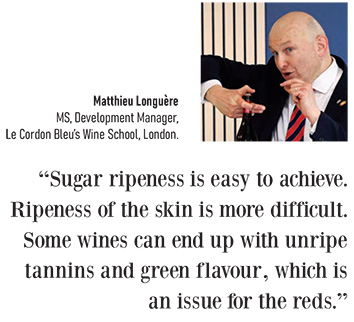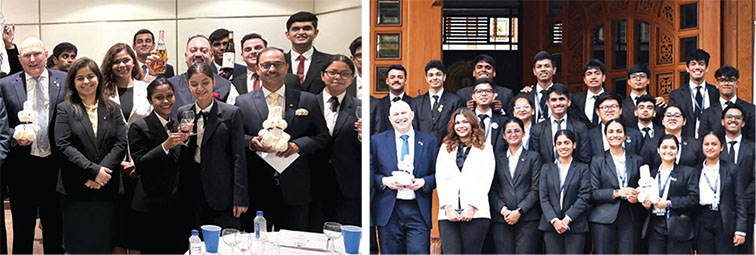Matthieu Longuère is a France-born, award-winning Master Sommelier with more than a quarter century of experience in leading positions in luxury and boutique hotels in the UK. He has done jury duty for the prestigious International Wine and Spirits Competition, as well as the 2019 Decanter World Wine Awards.
What brought you to India in March this year? Before your visit, what were your impressions about the country’s wine culture?
Le Cordon Bleu is celebrating 130 years this year, with special events held both locally and internationally. We have a strong connection with India, with many talented Indian alumni making their mark in the culinary, hospitality and wine industry. My visit to India was meant to mark this special milestone by showcasing the excellence of our wine education programmes.
The very little I knew about the country wine culture came from trying wines from the handful of producers imported in the UK. I was expecting consumers to be drawn to famous labels and taste wines that are full bodied, ripe and rich, rather than light and fresh.
What did your conversations tell you about the wine consumption market in India? Could you spot anything unusual/ unique?
Wine consumption in India seems to be mostly focused on the hospitality sector rather than retail and home consumption. In Europe, wine is traditionally part of the eating culture. Wine in India seems to be put in direct competition with other types of alcoholic beverage such as beer, whiskey, Tequila, rum… There is no generic differentiation between them all, and they all tend to be imbibed outside of the meal.
In hindsight, what opinions can you offer with reference to India’s viticulture, winemaking, sommeliers and educators?
We had no time to visit wineries. The wines I tasted tended to be quite rich and full, as befits the popular style among Indian wine drinkers. The wine industry being nascent, the temptation is to plant popular international grape varieties that probably need a longer growing season than what they get in India, with two potential harvest a year and very little time for the grapes to ripen.
Sugar ripeness is easy to achieve and not an issue. Ripeness of the skin is more difficult with a shorter hanging period of the grapes. Some wines can end up with unripe tannins and green flavour. Which is not an issue for white wines, but an issue for the reds.
I would think for that reason sparkling, white wine, rosé wine or fortified wines would offer the best potential. One hiccup though: Indian consumers seem to prefer reds! On the few wine lists I saw, the vintage of the white wines on offer were often 2 or 3 years older than the vintage of the red wines. It is usually the opposite.
Sommeliers and educators are academically and hospitality trained. But there is just not enough exposure to wine in general. Wine is expensive, and tasting for training purposes does not happen very often, even for sommeliers.
Add to that transport conditions that damage the wine and poor storage in a warm environment – it is difficult to come across bottles that taste the way they should. This is why a lot of Indian sommeliers choose to work outside of India, to get experience and practice.
What are the main factors to keep in mind when creating a wine list?
When creating a wine list in India, one should consider the budget, the style or theme of the restaurant, the customer demands, the numbers of covers and the quantity of wine sold per service, the food menu, and the time you expect the guests to stay in the restaurant.
If I were to make a wine list in India, I would do it slightly differently than in London. Unless we are talking about a wine-focused restaurant, I would keep the list below 100 references to make sure I get stock rotation and have enough temperature-controlled storage space.
Because wine can be intimidating for the guests and the staff alike, I would organise the list by style: light and aromatic, mineral and dry, fruity and soft, traditional and tannic, full bodied and rich. I would not organise it the traditional way, by type, country and region.
To make it an easy format to navigate, I would probably organise the wines within each category from light to heavy; it may present tasting notes but without any jargon and using a vocabulary more specific to the Indian consumer.
For each wine, I would provide the maximum information, so that staff and consumer can use it to anticipate the flavour profile of a wine. I would feature the category of wine and colour, the full name of the wine or appellation, the region of origin, the name of the producer, the country of origin, the grape variety, the vintage, the alcoholic percentage.
You were already an award-winning wine expert in the UK. What motivated you want to become a Master Sommelier?
I never really see the awards as being important; it is the journey that matters. The minute you start opening books, going to tasting, trying to improve yourself one way or another – this is the real award!
Of course, if you get an award that is a personal achievement, but it does not mean that someone cannot be a verry good wine professional if he/she has no awards to show for it. Curiosity, enthusiasm, thirst for learning and sharing your passion with others in an open minded, approachable way is what matters.
Can you tell us a little about Le Cordon Bleu in London? What makes an education there unique?
One of the factors that makes education at Le Cordon Bleu in London unique is the almost limitless varieties and styles of wines. As we keep the classes below 20 students, the delivery of the courses taught in London do not need to be standardised and can be tailored to the needs of the students. This is the case of our 6-month Diploma in Wine Gastronomy and Management.
We also introduce them to the industry by facilitating access to tasting. Finally, we approach all the subjects we teach in practical, not theoretical manner. These relate to hospitality, wine trade, retail, wineries, cellar door, wine sales, wine marketing…
You have been on the jury of renowned wine competitions. How have these experiences shaped/ altered your take on wine tasting and/ or opinion on awards?
If by wine competition you mean, judging/ tasting wine as an expert who rates wine and awards them, it is a really humbling experience and a learning curve. You are always part of a panel of experts on a specific theme or region. You are applying what you know about the style of wine, the taste of a specific grape variety grown under a specific circumstance.
The value of the award is dependent on the scope of the selection, the quality of the experts in terms of knowledge and real work experience. A good panel would have an expert on the region/ style of wine based in the region itself. Another member of the panel can be an expert on the same wine region but based outside of it. This helps him/her to remain impartial and bring a more global perspective to the judging.
What do you think the wine industry is looking for in a person today?
I think the wine industry is looking for in a person who is passionate and knowledgeable about their job, who makes sure to recommend the guests with the wine they want to drink, at the price they are ready to pay, disregarding their own preferences and attachment.
Knowledge though, can always be acquired with experience. A friendly and open approach to customer service is something that the person needs to have in the first place. All that makes sure the needs of the business are fulfilled.















